Ethical Considerations: Consumer Responsibility in Food Choices
VerifiedAdded on 2023/06/06
|8
|2197
|349
Essay
AI Summary
This essay delves into the ethical responsibilities of consumers concerning their food choices, drawing upon various academic sources to analyze the multifaceted aspects of ethical consumerism. The paper explores how consumer decisions regarding food can impact society, the environment, and individual health, examining concepts such as consumer social responsibility, the influence of trust in green products, and the role of media in shaping consumption habits. It highlights the importance of informed decision-making, considering factors like product origins, production methods, and the overall impact on sustainability and ethical practices. The analysis includes discussions on the fragmentation of the target market, the impact of ethics on consumer behavior, and the role of various stakeholders in influencing consumer choices, ultimately advocating for a more responsible and ethical approach to food consumption.
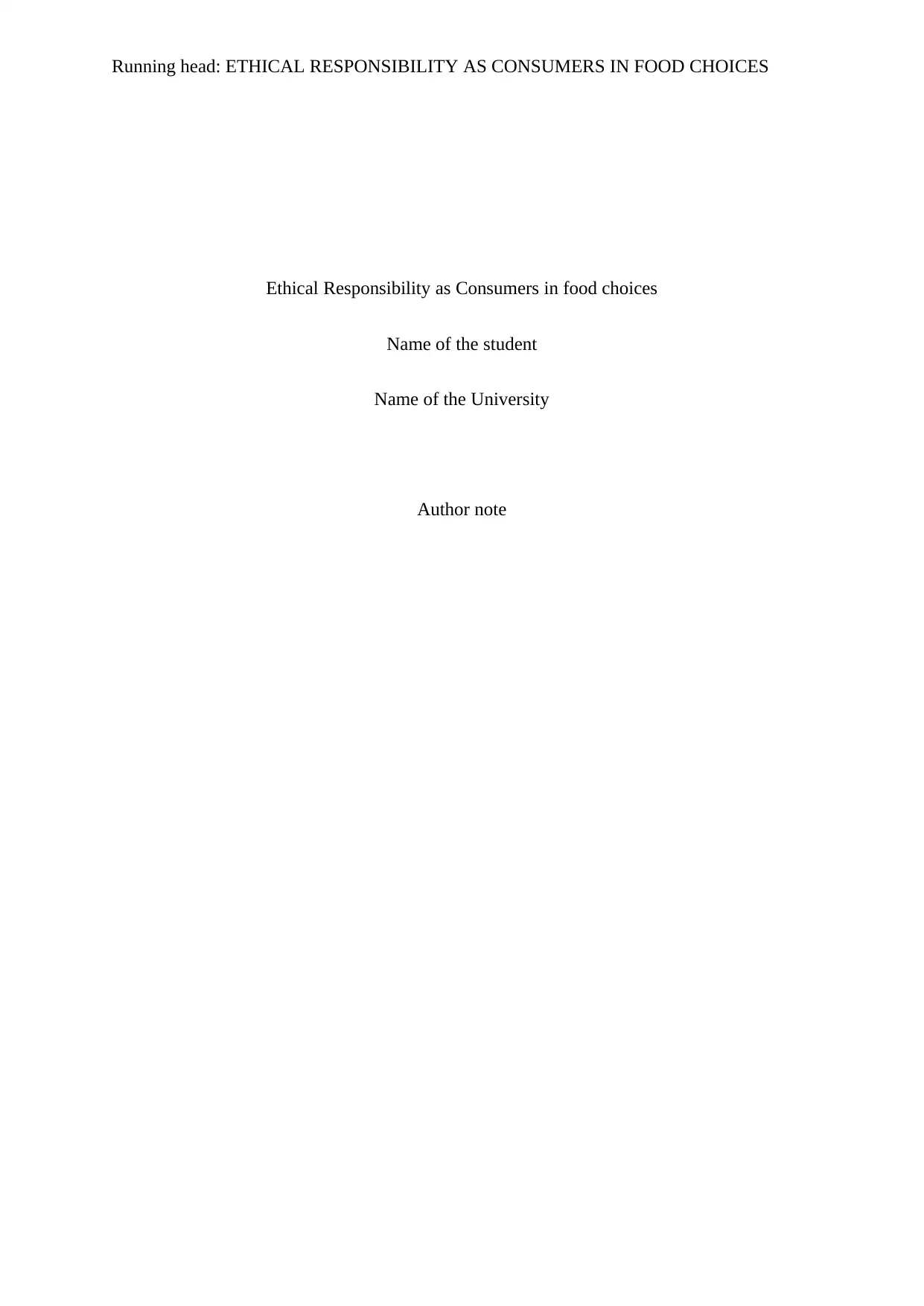
Running head: ETHICAL RESPONSIBILITY AS CONSUMERS IN FOOD CHOICES
Ethical Responsibility as Consumers in food choices
Name of the student
Name of the University
Author note
Ethical Responsibility as Consumers in food choices
Name of the student
Name of the University
Author note
Paraphrase This Document
Need a fresh take? Get an instant paraphrase of this document with our AI Paraphraser
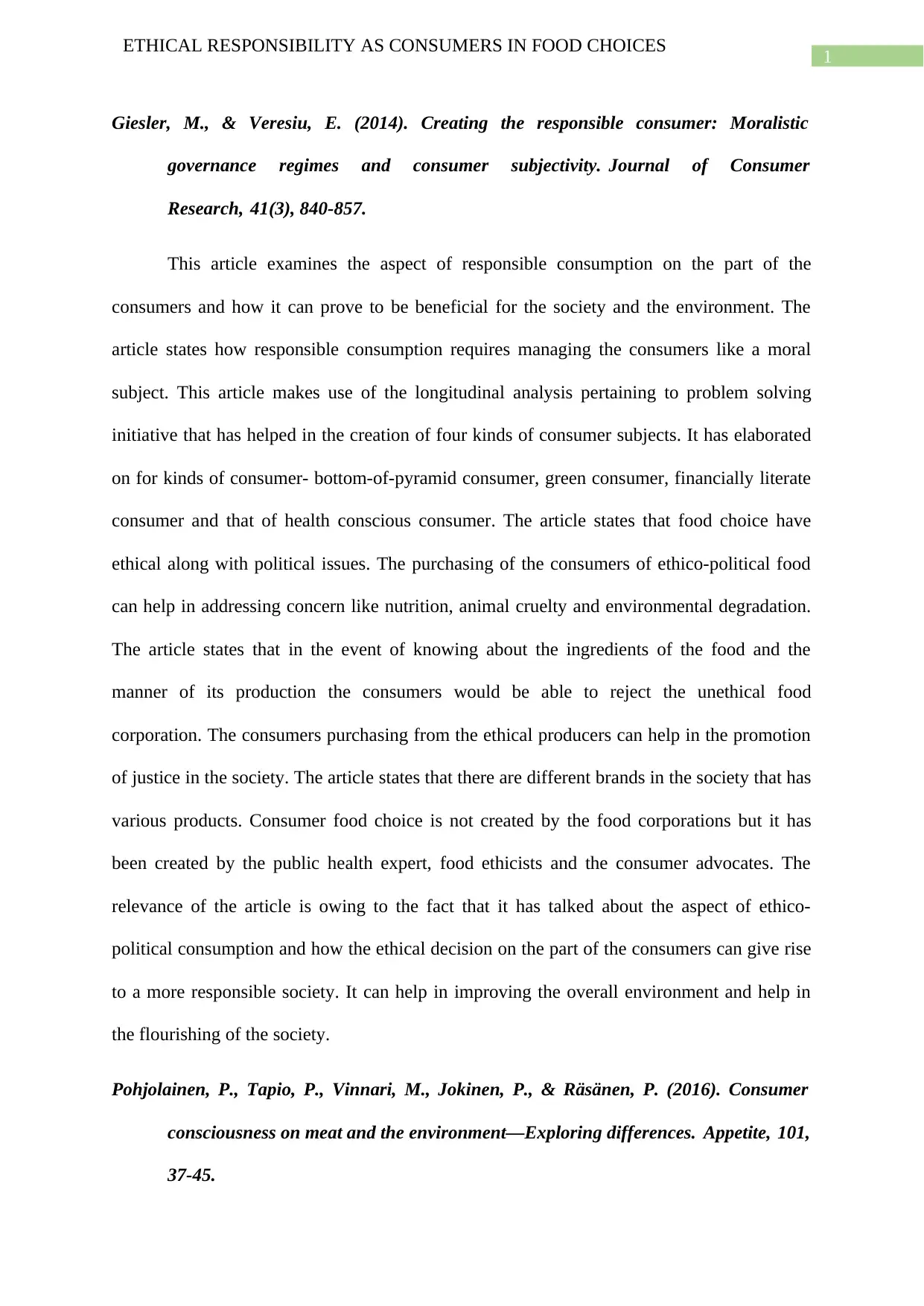
1
ETHICAL RESPONSIBILITY AS CONSUMERS IN FOOD CHOICES
Giesler, M., & Veresiu, E. (2014). Creating the responsible consumer: Moralistic
governance regimes and consumer subjectivity. Journal of Consumer
Research, 41(3), 840-857.
This article examines the aspect of responsible consumption on the part of the
consumers and how it can prove to be beneficial for the society and the environment. The
article states how responsible consumption requires managing the consumers like a moral
subject. This article makes use of the longitudinal analysis pertaining to problem solving
initiative that has helped in the creation of four kinds of consumer subjects. It has elaborated
on for kinds of consumer- bottom-of-pyramid consumer, green consumer, financially literate
consumer and that of health conscious consumer. The article states that food choice have
ethical along with political issues. The purchasing of the consumers of ethico-political food
can help in addressing concern like nutrition, animal cruelty and environmental degradation.
The article states that in the event of knowing about the ingredients of the food and the
manner of its production the consumers would be able to reject the unethical food
corporation. The consumers purchasing from the ethical producers can help in the promotion
of justice in the society. The article states that there are different brands in the society that has
various products. Consumer food choice is not created by the food corporations but it has
been created by the public health expert, food ethicists and the consumer advocates. The
relevance of the article is owing to the fact that it has talked about the aspect of ethico-
political consumption and how the ethical decision on the part of the consumers can give rise
to a more responsible society. It can help in improving the overall environment and help in
the flourishing of the society.
Pohjolainen, P., Tapio, P., Vinnari, M., Jokinen, P., & Räsänen, P. (2016). Consumer
consciousness on meat and the environment—Exploring differences. Appetite, 101,
37-45.
ETHICAL RESPONSIBILITY AS CONSUMERS IN FOOD CHOICES
Giesler, M., & Veresiu, E. (2014). Creating the responsible consumer: Moralistic
governance regimes and consumer subjectivity. Journal of Consumer
Research, 41(3), 840-857.
This article examines the aspect of responsible consumption on the part of the
consumers and how it can prove to be beneficial for the society and the environment. The
article states how responsible consumption requires managing the consumers like a moral
subject. This article makes use of the longitudinal analysis pertaining to problem solving
initiative that has helped in the creation of four kinds of consumer subjects. It has elaborated
on for kinds of consumer- bottom-of-pyramid consumer, green consumer, financially literate
consumer and that of health conscious consumer. The article states that food choice have
ethical along with political issues. The purchasing of the consumers of ethico-political food
can help in addressing concern like nutrition, animal cruelty and environmental degradation.
The article states that in the event of knowing about the ingredients of the food and the
manner of its production the consumers would be able to reject the unethical food
corporation. The consumers purchasing from the ethical producers can help in the promotion
of justice in the society. The article states that there are different brands in the society that has
various products. Consumer food choice is not created by the food corporations but it has
been created by the public health expert, food ethicists and the consumer advocates. The
relevance of the article is owing to the fact that it has talked about the aspect of ethico-
political consumption and how the ethical decision on the part of the consumers can give rise
to a more responsible society. It can help in improving the overall environment and help in
the flourishing of the society.
Pohjolainen, P., Tapio, P., Vinnari, M., Jokinen, P., & Räsänen, P. (2016). Consumer
consciousness on meat and the environment—Exploring differences. Appetite, 101,
37-45.
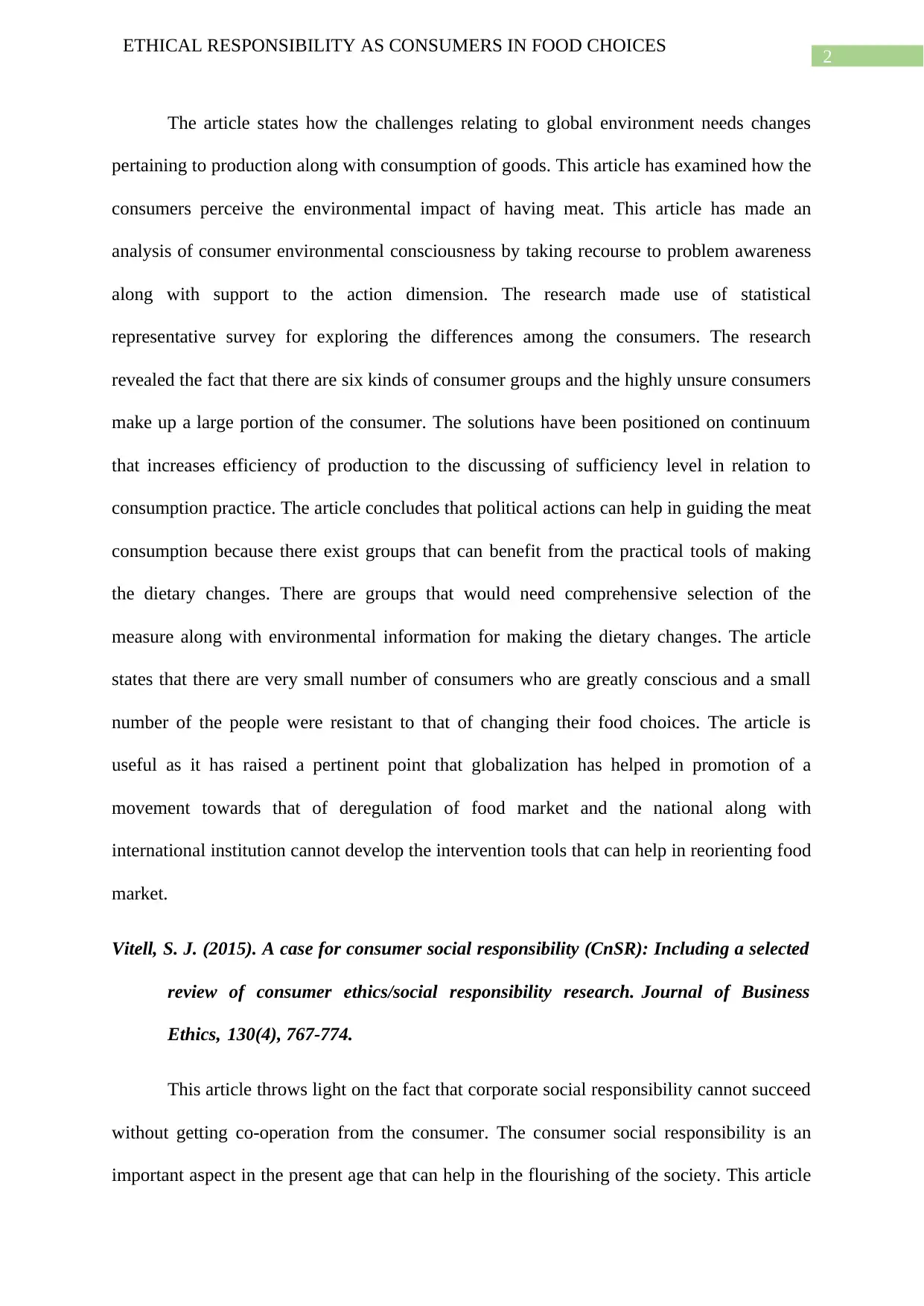
2
ETHICAL RESPONSIBILITY AS CONSUMERS IN FOOD CHOICES
The article states how the challenges relating to global environment needs changes
pertaining to production along with consumption of goods. This article has examined how the
consumers perceive the environmental impact of having meat. This article has made an
analysis of consumer environmental consciousness by taking recourse to problem awareness
along with support to the action dimension. The research made use of statistical
representative survey for exploring the differences among the consumers. The research
revealed the fact that there are six kinds of consumer groups and the highly unsure consumers
make up a large portion of the consumer. The solutions have been positioned on continuum
that increases efficiency of production to the discussing of sufficiency level in relation to
consumption practice. The article concludes that political actions can help in guiding the meat
consumption because there exist groups that can benefit from the practical tools of making
the dietary changes. There are groups that would need comprehensive selection of the
measure along with environmental information for making the dietary changes. The article
states that there are very small number of consumers who are greatly conscious and a small
number of the people were resistant to that of changing their food choices. The article is
useful as it has raised a pertinent point that globalization has helped in promotion of a
movement towards that of deregulation of food market and the national along with
international institution cannot develop the intervention tools that can help in reorienting food
market.
Vitell, S. J. (2015). A case for consumer social responsibility (CnSR): Including a selected
review of consumer ethics/social responsibility research. Journal of Business
Ethics, 130(4), 767-774.
This article throws light on the fact that corporate social responsibility cannot succeed
without getting co-operation from the consumer. The consumer social responsibility is an
important aspect in the present age that can help in the flourishing of the society. This article
ETHICAL RESPONSIBILITY AS CONSUMERS IN FOOD CHOICES
The article states how the challenges relating to global environment needs changes
pertaining to production along with consumption of goods. This article has examined how the
consumers perceive the environmental impact of having meat. This article has made an
analysis of consumer environmental consciousness by taking recourse to problem awareness
along with support to the action dimension. The research made use of statistical
representative survey for exploring the differences among the consumers. The research
revealed the fact that there are six kinds of consumer groups and the highly unsure consumers
make up a large portion of the consumer. The solutions have been positioned on continuum
that increases efficiency of production to the discussing of sufficiency level in relation to
consumption practice. The article concludes that political actions can help in guiding the meat
consumption because there exist groups that can benefit from the practical tools of making
the dietary changes. There are groups that would need comprehensive selection of the
measure along with environmental information for making the dietary changes. The article
states that there are very small number of consumers who are greatly conscious and a small
number of the people were resistant to that of changing their food choices. The article is
useful as it has raised a pertinent point that globalization has helped in promotion of a
movement towards that of deregulation of food market and the national along with
international institution cannot develop the intervention tools that can help in reorienting food
market.
Vitell, S. J. (2015). A case for consumer social responsibility (CnSR): Including a selected
review of consumer ethics/social responsibility research. Journal of Business
Ethics, 130(4), 767-774.
This article throws light on the fact that corporate social responsibility cannot succeed
without getting co-operation from the consumer. The consumer social responsibility is an
important aspect in the present age that can help in the flourishing of the society. This article
⊘ This is a preview!⊘
Do you want full access?
Subscribe today to unlock all pages.

Trusted by 1+ million students worldwide
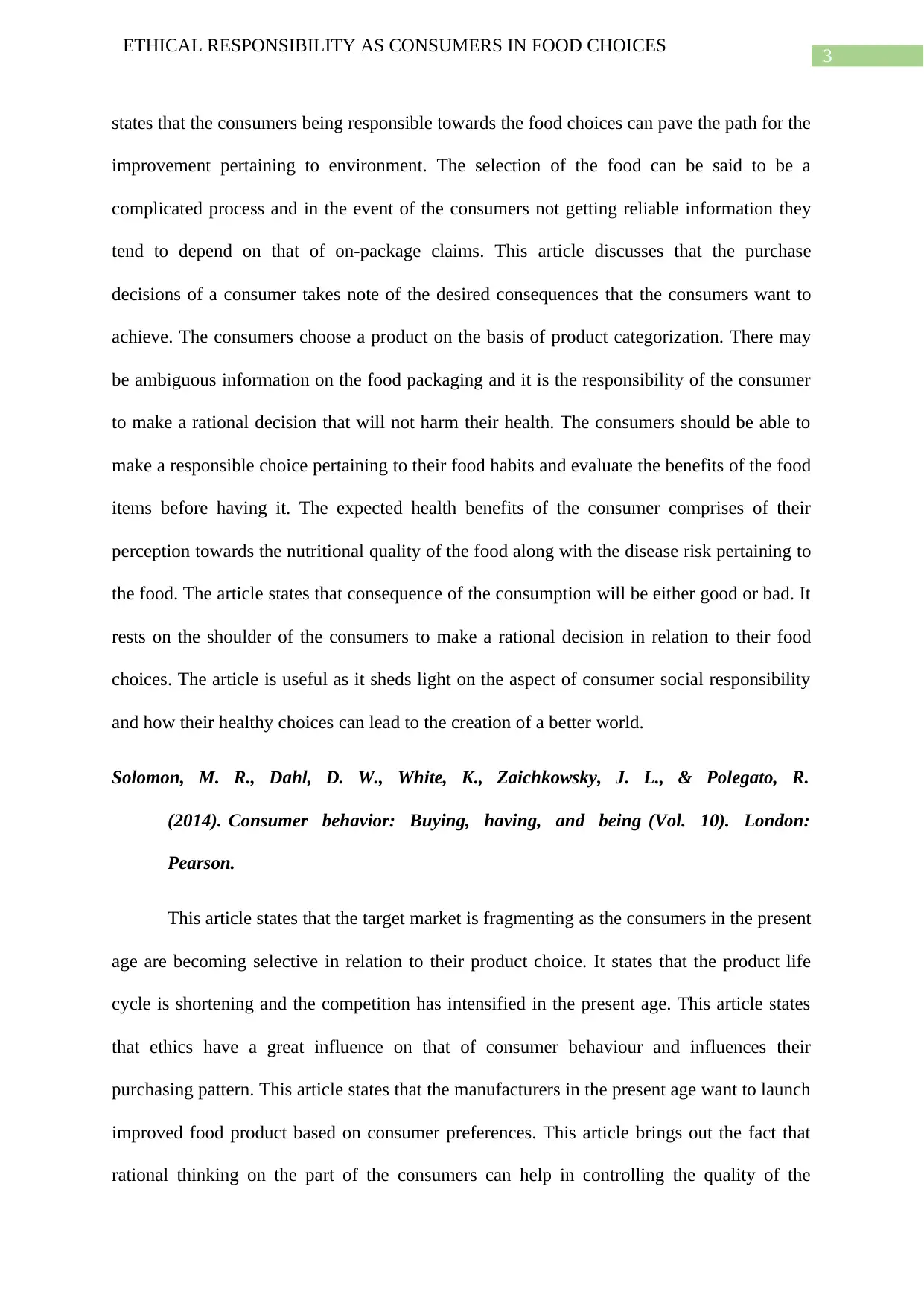
3
ETHICAL RESPONSIBILITY AS CONSUMERS IN FOOD CHOICES
states that the consumers being responsible towards the food choices can pave the path for the
improvement pertaining to environment. The selection of the food can be said to be a
complicated process and in the event of the consumers not getting reliable information they
tend to depend on that of on-package claims. This article discusses that the purchase
decisions of a consumer takes note of the desired consequences that the consumers want to
achieve. The consumers choose a product on the basis of product categorization. There may
be ambiguous information on the food packaging and it is the responsibility of the consumer
to make a rational decision that will not harm their health. The consumers should be able to
make a responsible choice pertaining to their food habits and evaluate the benefits of the food
items before having it. The expected health benefits of the consumer comprises of their
perception towards the nutritional quality of the food along with the disease risk pertaining to
the food. The article states that consequence of the consumption will be either good or bad. It
rests on the shoulder of the consumers to make a rational decision in relation to their food
choices. The article is useful as it sheds light on the aspect of consumer social responsibility
and how their healthy choices can lead to the creation of a better world.
Solomon, M. R., Dahl, D. W., White, K., Zaichkowsky, J. L., & Polegato, R.
(2014). Consumer behavior: Buying, having, and being (Vol. 10). London:
Pearson.
This article states that the target market is fragmenting as the consumers in the present
age are becoming selective in relation to their product choice. It states that the product life
cycle is shortening and the competition has intensified in the present age. This article states
that ethics have a great influence on that of consumer behaviour and influences their
purchasing pattern. This article states that the manufacturers in the present age want to launch
improved food product based on consumer preferences. This article brings out the fact that
rational thinking on the part of the consumers can help in controlling the quality of the
ETHICAL RESPONSIBILITY AS CONSUMERS IN FOOD CHOICES
states that the consumers being responsible towards the food choices can pave the path for the
improvement pertaining to environment. The selection of the food can be said to be a
complicated process and in the event of the consumers not getting reliable information they
tend to depend on that of on-package claims. This article discusses that the purchase
decisions of a consumer takes note of the desired consequences that the consumers want to
achieve. The consumers choose a product on the basis of product categorization. There may
be ambiguous information on the food packaging and it is the responsibility of the consumer
to make a rational decision that will not harm their health. The consumers should be able to
make a responsible choice pertaining to their food habits and evaluate the benefits of the food
items before having it. The expected health benefits of the consumer comprises of their
perception towards the nutritional quality of the food along with the disease risk pertaining to
the food. The article states that consequence of the consumption will be either good or bad. It
rests on the shoulder of the consumers to make a rational decision in relation to their food
choices. The article is useful as it sheds light on the aspect of consumer social responsibility
and how their healthy choices can lead to the creation of a better world.
Solomon, M. R., Dahl, D. W., White, K., Zaichkowsky, J. L., & Polegato, R.
(2014). Consumer behavior: Buying, having, and being (Vol. 10). London:
Pearson.
This article states that the target market is fragmenting as the consumers in the present
age are becoming selective in relation to their product choice. It states that the product life
cycle is shortening and the competition has intensified in the present age. This article states
that ethics have a great influence on that of consumer behaviour and influences their
purchasing pattern. This article states that the manufacturers in the present age want to launch
improved food product based on consumer preferences. This article brings out the fact that
rational thinking on the part of the consumers can help in controlling the quality of the
Paraphrase This Document
Need a fresh take? Get an instant paraphrase of this document with our AI Paraphraser
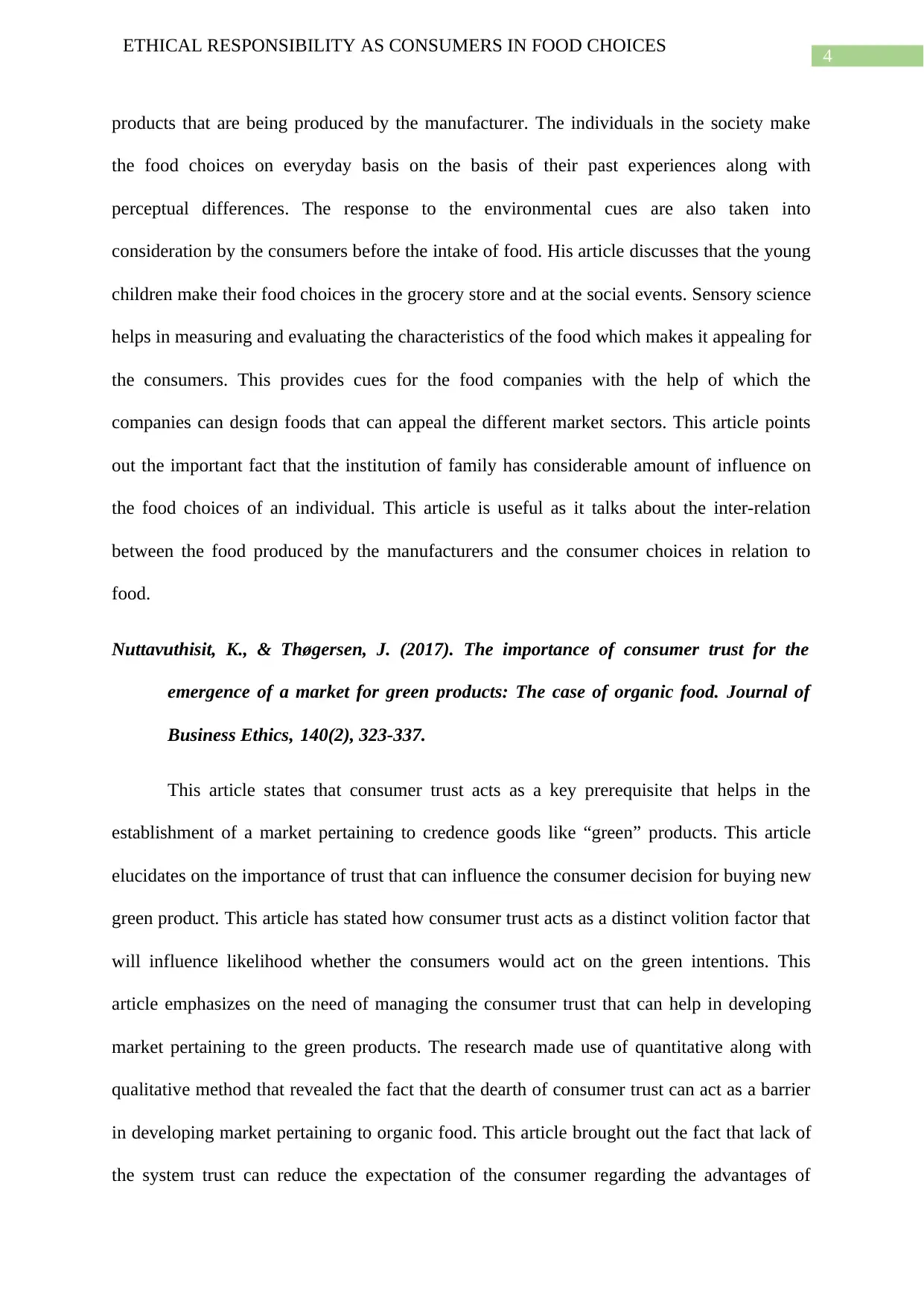
4
ETHICAL RESPONSIBILITY AS CONSUMERS IN FOOD CHOICES
products that are being produced by the manufacturer. The individuals in the society make
the food choices on everyday basis on the basis of their past experiences along with
perceptual differences. The response to the environmental cues are also taken into
consideration by the consumers before the intake of food. His article discusses that the young
children make their food choices in the grocery store and at the social events. Sensory science
helps in measuring and evaluating the characteristics of the food which makes it appealing for
the consumers. This provides cues for the food companies with the help of which the
companies can design foods that can appeal the different market sectors. This article points
out the important fact that the institution of family has considerable amount of influence on
the food choices of an individual. This article is useful as it talks about the inter-relation
between the food produced by the manufacturers and the consumer choices in relation to
food.
Nuttavuthisit, K., & Thøgersen, J. (2017). The importance of consumer trust for the
emergence of a market for green products: The case of organic food. Journal of
Business Ethics, 140(2), 323-337.
This article states that consumer trust acts as a key prerequisite that helps in the
establishment of a market pertaining to credence goods like “green” products. This article
elucidates on the importance of trust that can influence the consumer decision for buying new
green product. This article has stated how consumer trust acts as a distinct volition factor that
will influence likelihood whether the consumers would act on the green intentions. This
article emphasizes on the need of managing the consumer trust that can help in developing
market pertaining to the green products. The research made use of quantitative along with
qualitative method that revealed the fact that the dearth of consumer trust can act as a barrier
in developing market pertaining to organic food. This article brought out the fact that lack of
the system trust can reduce the expectation of the consumer regarding the advantages of
ETHICAL RESPONSIBILITY AS CONSUMERS IN FOOD CHOICES
products that are being produced by the manufacturer. The individuals in the society make
the food choices on everyday basis on the basis of their past experiences along with
perceptual differences. The response to the environmental cues are also taken into
consideration by the consumers before the intake of food. His article discusses that the young
children make their food choices in the grocery store and at the social events. Sensory science
helps in measuring and evaluating the characteristics of the food which makes it appealing for
the consumers. This provides cues for the food companies with the help of which the
companies can design foods that can appeal the different market sectors. This article points
out the important fact that the institution of family has considerable amount of influence on
the food choices of an individual. This article is useful as it talks about the inter-relation
between the food produced by the manufacturers and the consumer choices in relation to
food.
Nuttavuthisit, K., & Thøgersen, J. (2017). The importance of consumer trust for the
emergence of a market for green products: The case of organic food. Journal of
Business Ethics, 140(2), 323-337.
This article states that consumer trust acts as a key prerequisite that helps in the
establishment of a market pertaining to credence goods like “green” products. This article
elucidates on the importance of trust that can influence the consumer decision for buying new
green product. This article has stated how consumer trust acts as a distinct volition factor that
will influence likelihood whether the consumers would act on the green intentions. This
article emphasizes on the need of managing the consumer trust that can help in developing
market pertaining to the green products. The research made use of quantitative along with
qualitative method that revealed the fact that the dearth of consumer trust can act as a barrier
in developing market pertaining to organic food. This article brought out the fact that lack of
the system trust can reduce the expectation of the consumer regarding the advantages of
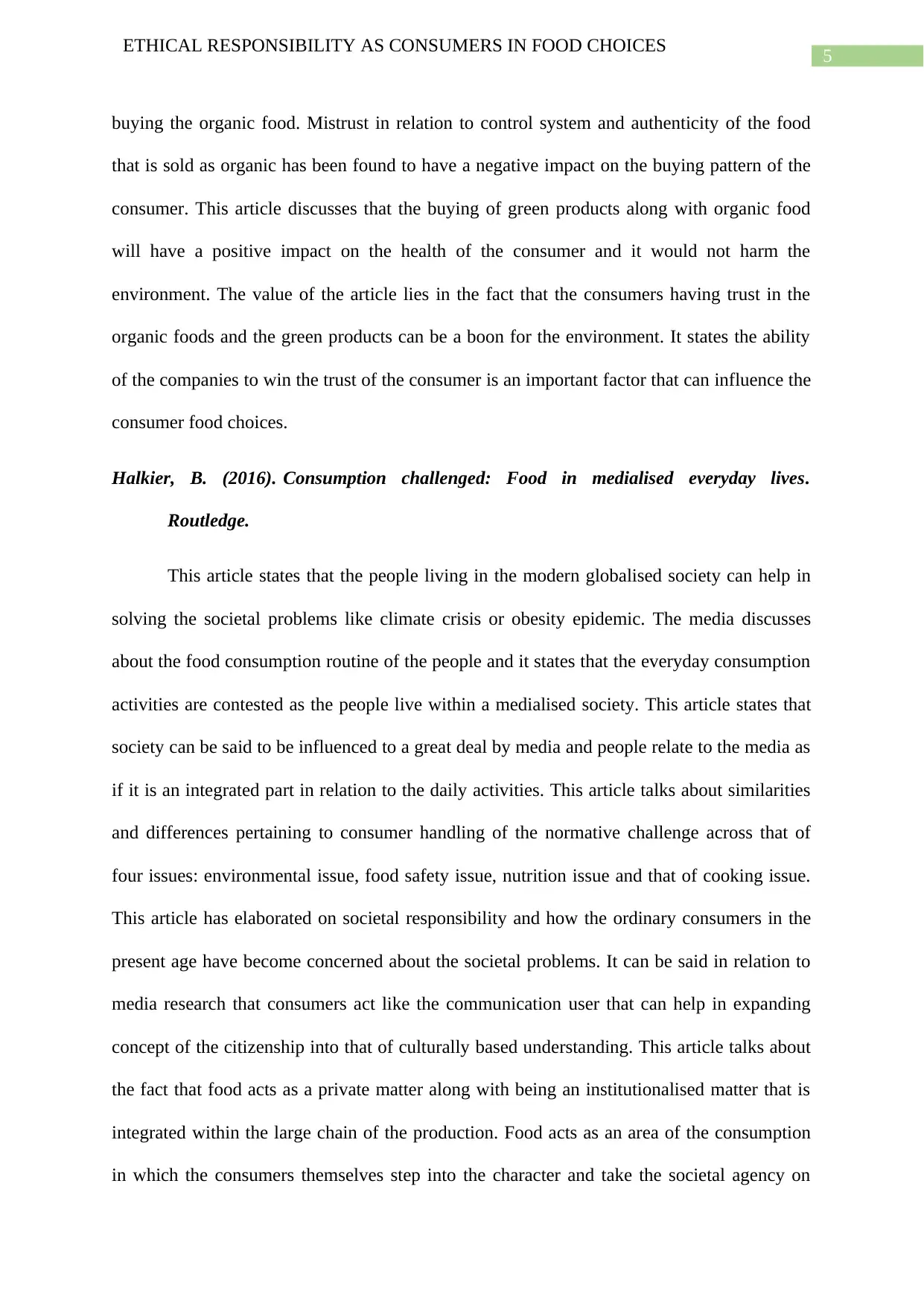
5
ETHICAL RESPONSIBILITY AS CONSUMERS IN FOOD CHOICES
buying the organic food. Mistrust in relation to control system and authenticity of the food
that is sold as organic has been found to have a negative impact on the buying pattern of the
consumer. This article discusses that the buying of green products along with organic food
will have a positive impact on the health of the consumer and it would not harm the
environment. The value of the article lies in the fact that the consumers having trust in the
organic foods and the green products can be a boon for the environment. It states the ability
of the companies to win the trust of the consumer is an important factor that can influence the
consumer food choices.
Halkier, B. (2016). Consumption challenged: Food in medialised everyday lives.
Routledge.
This article states that the people living in the modern globalised society can help in
solving the societal problems like climate crisis or obesity epidemic. The media discusses
about the food consumption routine of the people and it states that the everyday consumption
activities are contested as the people live within a medialised society. This article states that
society can be said to be influenced to a great deal by media and people relate to the media as
if it is an integrated part in relation to the daily activities. This article talks about similarities
and differences pertaining to consumer handling of the normative challenge across that of
four issues: environmental issue, food safety issue, nutrition issue and that of cooking issue.
This article has elaborated on societal responsibility and how the ordinary consumers in the
present age have become concerned about the societal problems. It can be said in relation to
media research that consumers act like the communication user that can help in expanding
concept of the citizenship into that of culturally based understanding. This article talks about
the fact that food acts as a private matter along with being an institutionalised matter that is
integrated within the large chain of the production. Food acts as an area of the consumption
in which the consumers themselves step into the character and take the societal agency on
ETHICAL RESPONSIBILITY AS CONSUMERS IN FOOD CHOICES
buying the organic food. Mistrust in relation to control system and authenticity of the food
that is sold as organic has been found to have a negative impact on the buying pattern of the
consumer. This article discusses that the buying of green products along with organic food
will have a positive impact on the health of the consumer and it would not harm the
environment. The value of the article lies in the fact that the consumers having trust in the
organic foods and the green products can be a boon for the environment. It states the ability
of the companies to win the trust of the consumer is an important factor that can influence the
consumer food choices.
Halkier, B. (2016). Consumption challenged: Food in medialised everyday lives.
Routledge.
This article states that the people living in the modern globalised society can help in
solving the societal problems like climate crisis or obesity epidemic. The media discusses
about the food consumption routine of the people and it states that the everyday consumption
activities are contested as the people live within a medialised society. This article states that
society can be said to be influenced to a great deal by media and people relate to the media as
if it is an integrated part in relation to the daily activities. This article talks about similarities
and differences pertaining to consumer handling of the normative challenge across that of
four issues: environmental issue, food safety issue, nutrition issue and that of cooking issue.
This article has elaborated on societal responsibility and how the ordinary consumers in the
present age have become concerned about the societal problems. It can be said in relation to
media research that consumers act like the communication user that can help in expanding
concept of the citizenship into that of culturally based understanding. This article talks about
the fact that food acts as a private matter along with being an institutionalised matter that is
integrated within the large chain of the production. Food acts as an area of the consumption
in which the consumers themselves step into the character and take the societal agency on
⊘ This is a preview!⊘
Do you want full access?
Subscribe today to unlock all pages.

Trusted by 1+ million students worldwide
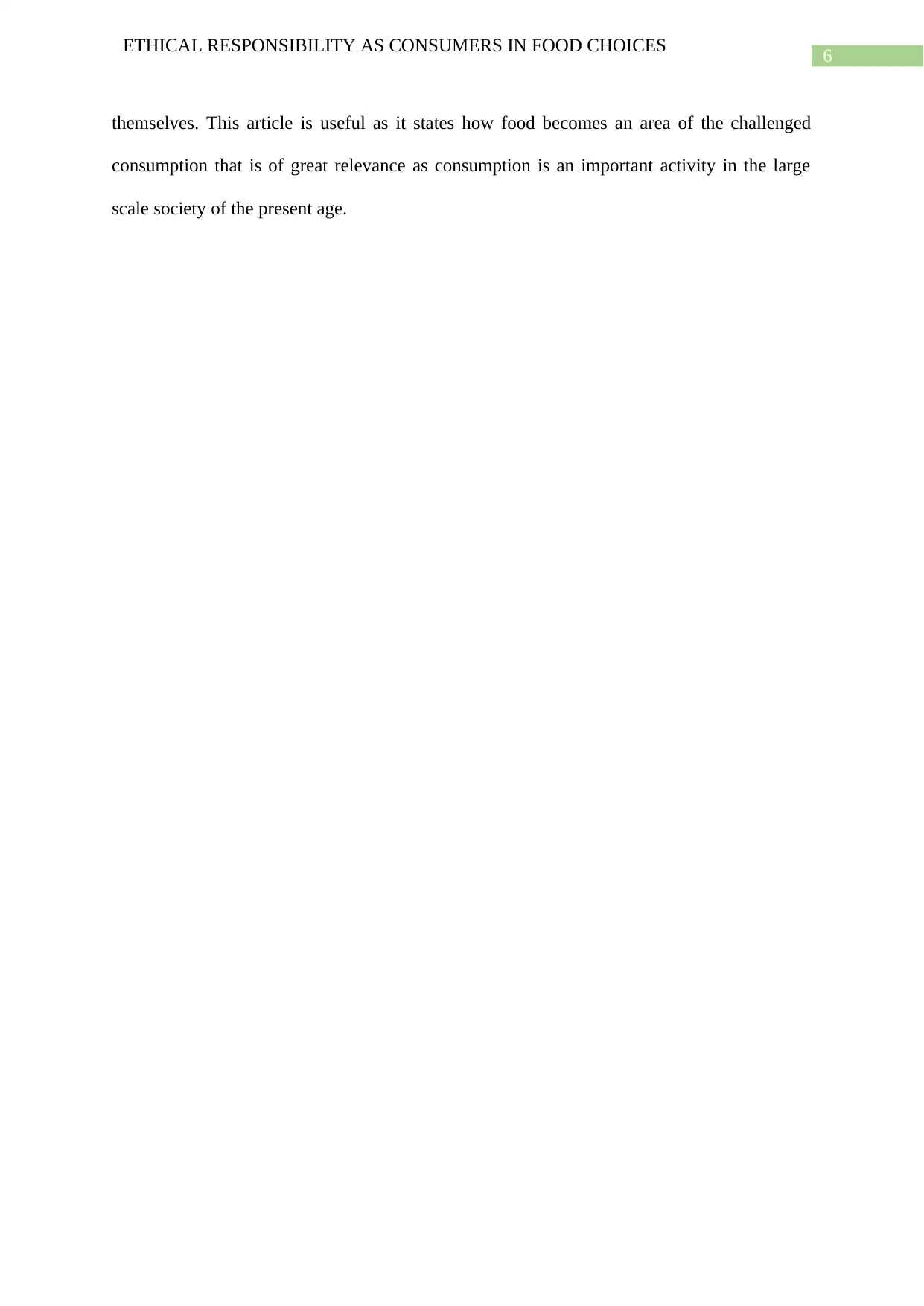
6
ETHICAL RESPONSIBILITY AS CONSUMERS IN FOOD CHOICES
themselves. This article is useful as it states how food becomes an area of the challenged
consumption that is of great relevance as consumption is an important activity in the large
scale society of the present age.
ETHICAL RESPONSIBILITY AS CONSUMERS IN FOOD CHOICES
themselves. This article is useful as it states how food becomes an area of the challenged
consumption that is of great relevance as consumption is an important activity in the large
scale society of the present age.
Paraphrase This Document
Need a fresh take? Get an instant paraphrase of this document with our AI Paraphraser
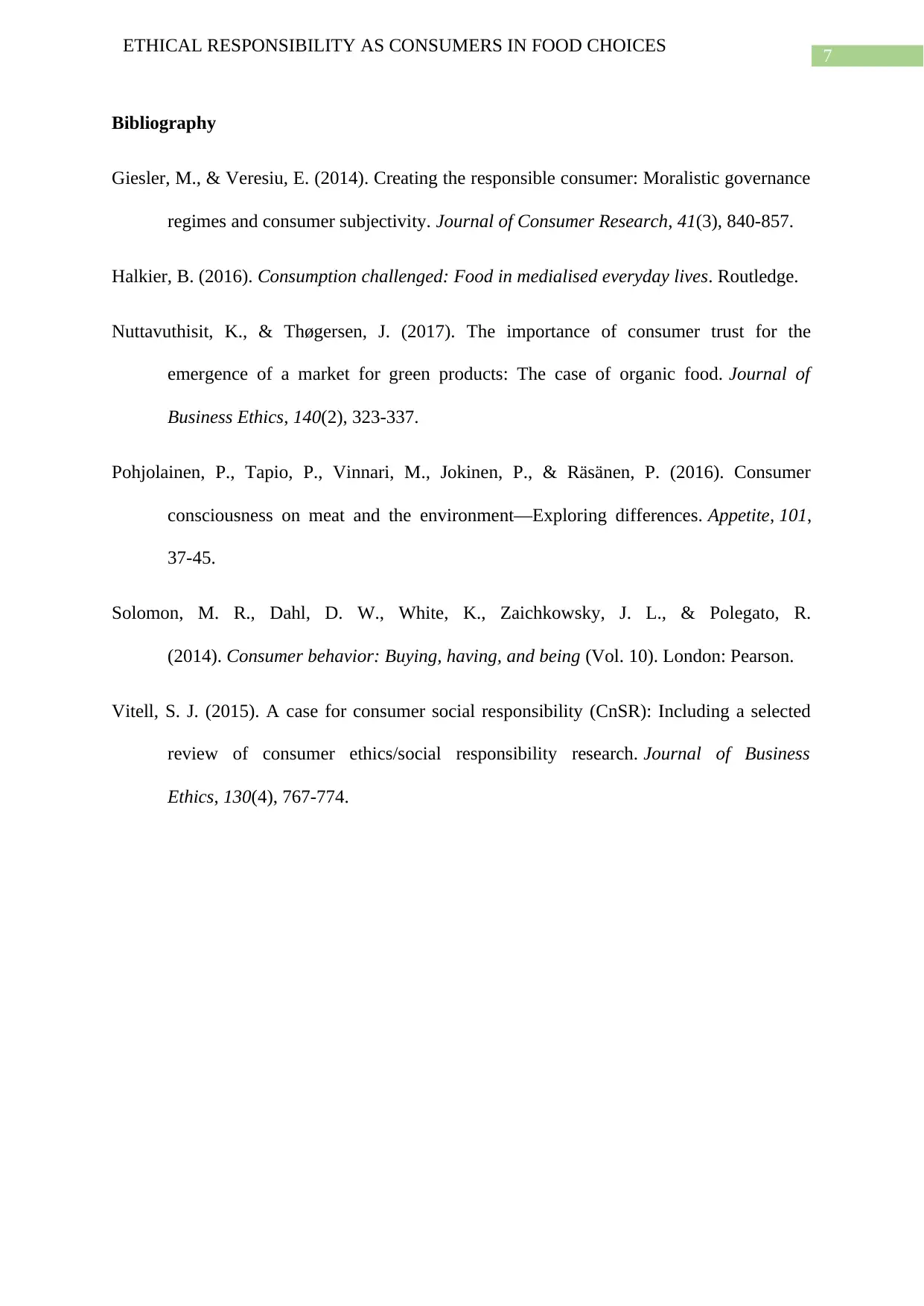
7
ETHICAL RESPONSIBILITY AS CONSUMERS IN FOOD CHOICES
Bibliography
Giesler, M., & Veresiu, E. (2014). Creating the responsible consumer: Moralistic governance
regimes and consumer subjectivity. Journal of Consumer Research, 41(3), 840-857.
Halkier, B. (2016). Consumption challenged: Food in medialised everyday lives. Routledge.
Nuttavuthisit, K., & Thøgersen, J. (2017). The importance of consumer trust for the
emergence of a market for green products: The case of organic food. Journal of
Business Ethics, 140(2), 323-337.
Pohjolainen, P., Tapio, P., Vinnari, M., Jokinen, P., & Räsänen, P. (2016). Consumer
consciousness on meat and the environment—Exploring differences. Appetite, 101,
37-45.
Solomon, M. R., Dahl, D. W., White, K., Zaichkowsky, J. L., & Polegato, R.
(2014). Consumer behavior: Buying, having, and being (Vol. 10). London: Pearson.
Vitell, S. J. (2015). A case for consumer social responsibility (CnSR): Including a selected
review of consumer ethics/social responsibility research. Journal of Business
Ethics, 130(4), 767-774.
ETHICAL RESPONSIBILITY AS CONSUMERS IN FOOD CHOICES
Bibliography
Giesler, M., & Veresiu, E. (2014). Creating the responsible consumer: Moralistic governance
regimes and consumer subjectivity. Journal of Consumer Research, 41(3), 840-857.
Halkier, B. (2016). Consumption challenged: Food in medialised everyday lives. Routledge.
Nuttavuthisit, K., & Thøgersen, J. (2017). The importance of consumer trust for the
emergence of a market for green products: The case of organic food. Journal of
Business Ethics, 140(2), 323-337.
Pohjolainen, P., Tapio, P., Vinnari, M., Jokinen, P., & Räsänen, P. (2016). Consumer
consciousness on meat and the environment—Exploring differences. Appetite, 101,
37-45.
Solomon, M. R., Dahl, D. W., White, K., Zaichkowsky, J. L., & Polegato, R.
(2014). Consumer behavior: Buying, having, and being (Vol. 10). London: Pearson.
Vitell, S. J. (2015). A case for consumer social responsibility (CnSR): Including a selected
review of consumer ethics/social responsibility research. Journal of Business
Ethics, 130(4), 767-774.
1 out of 8
Related Documents
Your All-in-One AI-Powered Toolkit for Academic Success.
+13062052269
info@desklib.com
Available 24*7 on WhatsApp / Email
![[object Object]](/_next/static/media/star-bottom.7253800d.svg)
Unlock your academic potential
Copyright © 2020–2026 A2Z Services. All Rights Reserved. Developed and managed by ZUCOL.





